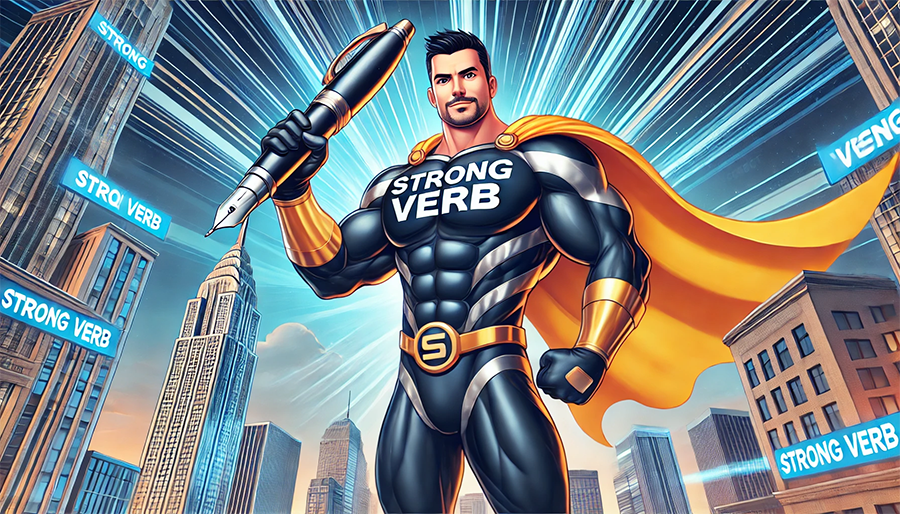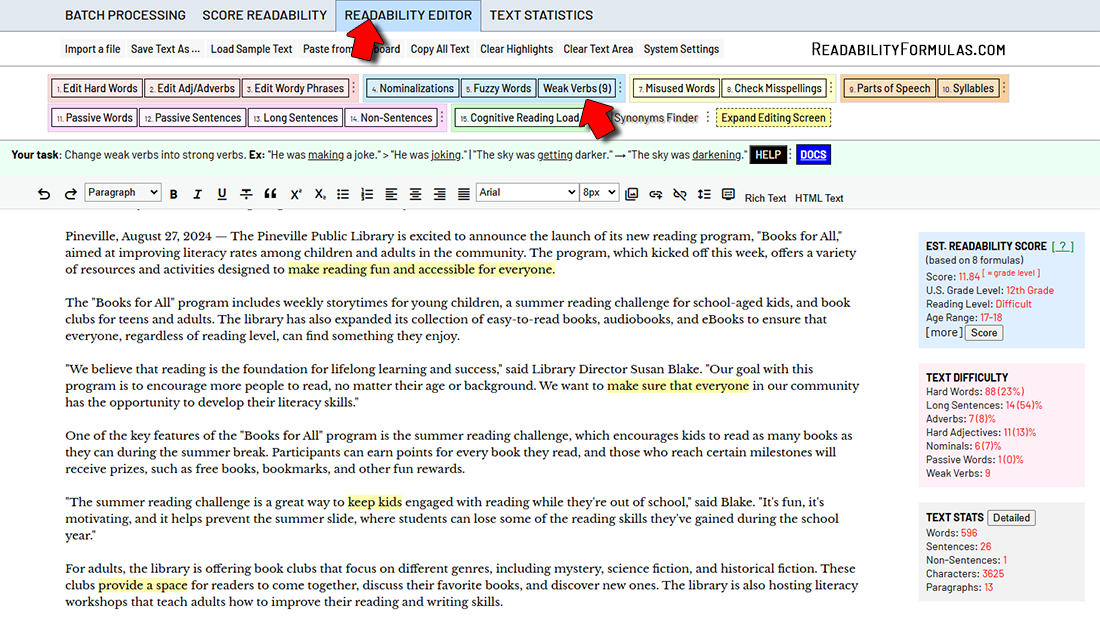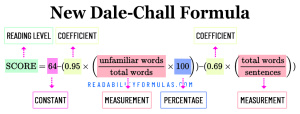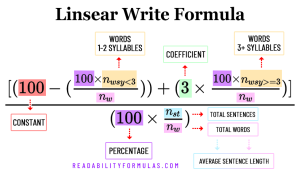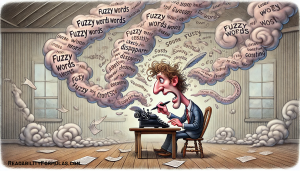Writing is an art that hinges on clarity, engagement, and brevity. You can enrich your writing by replacing weak verbs with strong verbs. Strong verbs are vivid and engaging. They remove filler words and focus on action. But weak verbs need other verbs, adverbs or adjectives to express action. This results in wordy and static sentences. If a verb needs an adverb or adjective, then it’s weak, and should be replaced.
Replace the weak verb and adjective with a single strong verb. Learn how to do it by following these examples:
| Original Sentence | Revised Sentence |
|---|---|
| She walked (v.) slowly (adj.) through the park. | She strolled (v.) through the park. |
| He was eating (v.) his dinner quickly (adj.). | He gobbled (v.) his dinner. |
| They talked (v.) loudly (adj.) during the movie. | They shouted (v.) during the movie. |
| She looked (v.) carefully (adj.) at the painting. | She scrutinized (v.) the painting. |
| The dog barked (v.) loudly (adj.) at the moon. | The dog howled (v.) at the moon. |
| He was working (v.) diligently (adj.) on his project. | He was laboring (v.) on his project. |
| She was laughing (v.) uncontrollably (adj.). | She was cackling (v.). |
| They walked (v.) quietly (adj.) through the forest. | They tiptoed (v.) through the forest. |
| He read (v.) the book intently (adj.). | He devoured (v.) the book. |
| She was running (v.) quickly (adj.) to catch the bus. | She sprinted (v.) to catch the bus. |
| The car moved (v.) slowly (adj.) down the street. | The car coasted (v.) down the street. |
| The sun was shining (v.) brightly (adj.). | The sun blazed (v.). |
| The water was flowing (v.) rapidly (adj.). | The water was gushing (v.). |
| He was sitting (v.) quietly (adj.) in the corner. | He was perched (v.) in the corner. |
| She sang (v.) beautifully (adj.). | She serenaded. |
| The students were studying (v.) hard (adj.) for their exams. | The students crammed (v.) for their exams. |
| He was thinking (v.) deeply (adj.) about the problem. | He was pondering (v.) the problem. |
| They were dancing (v.) energetically (adj.) on the dance floor. | They twirled (v.) on the dance floor. |
| She was writing (v.) furiously (adj.) in her notebook. | She was scribbling (v.) in her notebook. |
| He was looking (v.) longingly (adj.) at the stars. | He was gazing (v.) at the stars. |
| The kids played (v.) happily (adj.) in the yard. | The kids frolicked (v.) in the yard. |
Nouns Hide Clues
If the weak verb is not supported by an adverb or adjective, then clue in on the noun to suggest a stronger verb.
| Original Sentence | Transformed Sentence |
|---|---|
| She was performing (v.) the song (n). | She was singing. |
| She made (v.) a decision (n). | She decided (v.). |
| He was giving (v.) a speech (n.) to the audience. | He was speaking (v.) to the audience. |
| He was taking (v.) a walk (n.) in the park. | He was walking (v.) in the park. |
| He took (v.) a step (n.) backwards. | He stepped (v.) backwards. |
| The scientist is conducting (v.) an experiment (n.). | The scientist is experimenting (v.). |
| The manager was giving (v.) instructions (n.). | The manager was instructing (v.). |
| He was making (v.) repairs (n.) to the car. | He was repairing (v.) the car. |
| She made (v.) a selection (n.) from the dresses. | She selected (v.) a dress. |
| The employee was making (v.) the boss angry (n.). | The employee was angering (v.) the boss. |
| He stepped (v.) on the brake (n.) to stop the car. | He braked (v.). |
| She was working (v.) in the garden (n.). | She was gardening (v.). |
Another way to find weak verbs is to look for these verbs in your text:
These weak verbs are abstract; they need auxiliary words to convey precise meaning. They can make writing less vivid and dynamic.
Have/Having/Had/Has
They had a discussion about the project. → They discussed the project.
They had a meeting to discuss the issues. → They met to discuss the issues.
They had a rest after the hike. → They rested after the hike.
They had a debate on the topic. → They debated the topic.
They had a conversation about their plans. → They conversed about their plans.
Got/Get/Getting
She got a new car. → She bought a new car.
Police gave a command to drop the gun. → Police commanded to drop the gun.
He was getting credit for working hard. → The boss credited him for working hard.
The sky got darker as the sun set. → The sky darkened as the sun set.
She got an award for her performance. → She was awarded for her performance.
The situation got worse over time. → The situation worsened over time.
Do/Does/Did
The storm did damage to the houses. → The storm damaged the houses.
They did a thorough inspection. → They inspected thoroughly.
He did a painting of the landscape. → He painted the landscape.
She does volunteer work every weekend. → She volunteers every weekend.
He did all the cooking for the event. → He cooked everything for the event.
Create/Creates/Created/Creating
They created a plan to launch a new product. → They planned to launch a new product.
He created a budget for the project. → He budgeted for the project.
He creates new challenges for himself at the gym. → He challenges himself at the gym.
He created a backup of all the files. → He backed up all the files.
They created an outline for the report. → They outlined the report.
Take/Takes/Took/Taking
The detective took a look at the evidence. → The detective looked at the photos.
She took a picture of the sunset. → She photographed the sunset.
She took a trip to Europe. → She traveled to Europe.
He takes notes during the lecture. → He notes down information during the lecture.
They took control of the situation. → They controlled the situation.
He takes the dog for a walk every morning. → He walks the dog every morning.
They were taking a hike in the mountains. → They were hiking in the mountains.
Give/Gives/Gave/Giving
She gave an explanation about being late for work. → She explained why she was late for work.
He was giving a presentation at the museum. → He was presenting at the museum.
He gave a speech at the workshop. → He spoke at the workshop.
She gives her boyfriend a hug every morning. → She hugs her boyfriend every morning.
He gave her a compliment. → He complimented her.
She gave a detailed description of the event. → She described the event in detail.
She gave a warning about the dangers. → She warned about the dangers.
Make/Makes/Made/Making
He was making observations about the insects. → He was observing the insects.
He makes a lot of noise when he works. → He is noisy when he works.
He made an investment in stocks. → He invested in stocks.
She made a discovery during her research. → She discovered something during her research.
She made a promise to be on time. → She promised to be on time.
Weak Verbs or Simple Verbs?
It’s not necessary to replace all weak verbs with strong verbs. The concept of a “weak” verb is context-dependent and relates to how the verb conveys action or meaning. A weak verb might be the right choice for that sentence, but needs a strong verb in a follow-up sentence. If you can’t replace a weak verb with a strong one, then leave as is. Consider the “weak” verb as a “simple” verb.
Here are scenarios when weak verbs are okay to use:
| Scenario | Sentence with Weak Verb | Explanation |
|---|---|---|
| Informal Communication | She did a great job. | In casual or everyday conversations, simpler language is more natural and appropriate. |
| Broad Audience | He got a book from the library. | When writing for a general audience, favor clarity and brevity over preciseness. |
| Technical Documentation | The system does a check of the inputs. | In technical contexts, a weak verb paired with technical jargon can convey precise meaning. |
| Conveying Routine Actions | She made breakfast. | For routine actions, using a weak verb can keep the writing straightforward and concise. |
| Balancing Sentence Structure | He decided to make a change. | A weak verb can balance sentence structure and maintain readability. |
| Avoiding Redundancy | They had a meeting to discuss the project. | In contexts where the meaning is clear and specific verbs might seem redundant, use weak verbs. |
| Establishing Tone | She did what she could to help. | Using weak verbs can add to a conversational or empathetic tone in writing. |
| General Statements | He made a mistake. | For general statements where details are unimportant, weak verbs add necessary clarity. |
| Transition Sentences | They got ready to leave. | Weak verbs can be useful in transition sentences to maintain the narrative’s flow. |
| Common Expressions | She did her best. | Common expressions and idiomatic phrases use weak verbs to convey a familiar meaning. |
Here are common scenarios when you should use strong verbs:
| Scenario | Sentence with Strong Verb | Explanation |
|---|---|---|
| Creative Writing | She sprinted to catch the bus. | Strong verbs create vivid imagery and make the narrative more engaging. |
| Technical Writing | The system validated the inputs. | Precision is crucial in technical contexts to avoid ambiguity. |
| Business Communication | He proposed a new strategy. | Strong verbs convey confidence and clarity in professional settings. |
| Academic Writing | The study examines the effects of climate change. | Strong verbs ensure actions are clearly understood. |
| Persuasive Writing | She advocated for policy reform. | Strong verbs make arguments more compelling and persuasive. |
| Descriptive Writing | The storm devastated the coastline. | Strong verbs enhance descriptions and evoke emotions in the reader. |
| Journalistic Writing | The reporter uncovered the truth. | Strong verbs ensure clarity and precision in news reporting. |
| Instructions and Procedures | Mix the ingredients thoroughly. | Strong verbs provide clear, concise directions for readers to follow. |
| Resumes and Cover Letters | He strategized new marketing plans. | Strong verbs highlight accomplishments and skills effectively. |
| Storytelling | He whispered a secret to his friend. | Strong verbs create an immersive story experience. |
Robert Gunning, an expert on writing, said: “Strong, specific nouns and verbs are the backbone of clear, concise sentences.” Gunning’s advice is all about using fewer words to say more. And that’s what strong verbs do.
Imagine if politicians took his advice. Instead of long speeches, they’d just say, “Taxes. Lowered.” That’s it, campaign done. Votes are in!
Think about action movies. “He fought bravely against the enemies” becomes “He battled enemies.” See? Shorter, stronger, and way more badass.
Strong verbs do make a difference.
So next time you’re writing something, channel your inner Gunning. Cut the fluff, ditch the weak words, and keep it strong and simple. Or, you know, just text “Hey.” Gunning would approve.
Use the Robert Gunning Editor to Highlight Weak Verbs
Use our free Robert Gunning Editor to highlight all weak verbs in your text. Import your text into our Readability Scoring System, click on the Readability Editor tab, then click the Weak Verbs button. The editor will highlight all weak verbs in yellow. This feature will help you to quickly review and improve weak verbs in your text.
Scott, Brian. “How to Edit Weak Verbs into Strong Verbs to Improve Readability.” ReadabilityFormulas.com, 23 Feb. 2025, https://readabilityformulas.com/how-to-edit-weak-verbs-into-strong-verbs/.
